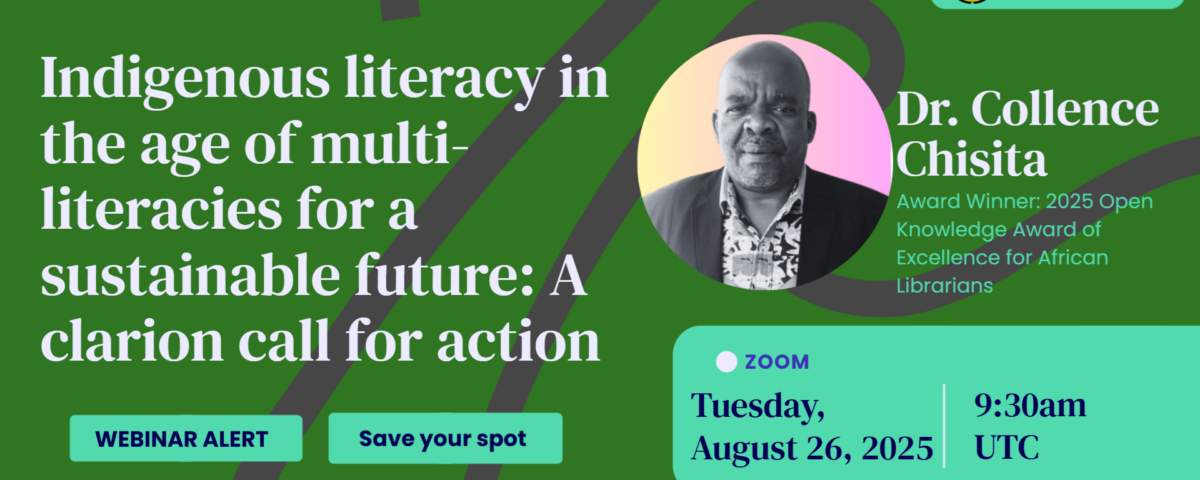Indigenous literacy in the age of multi-literacies for a sustainable future: A clarion call for action

As more people push back against new forms of colonial control (neo-colonialism) and work towards true independence (de-colonialism), it has become imperative for libraries, especially public and community to rethink, reset and strategise on how to design inclusive culturally responsive library experiences.
There is still much more that can be accomplished in light of the various, intricate, and expanding needs of indigenous communities, even though public libraries have been providing meaningful services to them since the adoption of the United Nations Declaration on the Rights of Indigenous Peoples (2007).
It is imperative to explore the extent to which libraries, especially the public and community libraries, in Africa have aligned their policies and services to the international guidelines like the IFLA UNESCO Public Library Manifesto (2022) and the United Nations Declaration on the Rights of Indigenous Peoples (2007). Failure to align information and
library services with the growing calls for cultural inclusivity has a significant impact on national development as well as sustainable development. This highlights the need to probe the services provided by libraries in this regard.
Among the various ways of generating meaning that include visual, oral, gestural, spatial, and cultural literacy, this webinar will;
- Examine indigenous literacy and how it is incorporated into public library services.
- Explore and discuss the challenges and opportunities for public and community libraries as spaces for multi-voices encounters in providing for the literacy needs of the indigenous communities in an age of constant change.
- Offer recommendations for public libraries to protect the epistemic rights of indigenous communities, as the globe progresses towards socio-cultural inclusion.
Webinar Topic
Indigenous literacy in the age of multi-literacies for a sustainable future: A clarion call for action
Date – Tuesday, August 26, 2025
Time – 9:30am UTC | 10:30am WAT | 11:30am CAT/SAST | 12:00noon EAT
Target Audience:
This training is ideal for:
- African public and community library staff and volunteers.
- Library associations and professional bodies.
- Policy makers in culture, education, and information sectors.
- Researchers and scholars in library science, cultural studies, indigenous knowledge, and decolonization.
- Educators and literacy advocates, especially those promoting culturally responsive literacy.
- Students of library and information science
- Any other interested professional.
Registration
Click button to register. Kindly note that once you register, you will receive reminders about the event.
Resource person:

Dr. Collence T. Chisita holds a PhD in Library and Information Science. He is currently with the Department of Information Systems at the Durban University of Technology, South Africa. He has previously served as a Research Fellow in the Department of Information Science at the University of South Africa (UNISA), and has also worked with the University of Johannesburg and the Grassroots African Research Network (GARNET) under the Methodslab project. In recognition of his outstanding contributions to open knowledge, open access, and knowledge equity within the African library sector, Dr. Chisita was awarded the 2025 Open Knowledge Award of Excellence for African Librarians by the African Library and Information Associations and Institutions (AfLIA). He is an active editor, writer, researcher, and lecturer. ORCID: https://orcid.org/0000-0002-7375-8627
Technical requirements
Upon registration, reminders will be sent to all registrants periodically. This webinar will be hosted on Zoom Conferencing Platform. Participants, who do not have Zoom on their mobile devices and or computers, need to download, install and create an account on Zoom ahead of time (CLICK TO DOWNLOAD). Webinar attendees are encouraged to join early, preferably 15 minutes before the start of the webinar, as one may need time launch the application. The speaker will use a webcam to connect with attendees. Audio and video for the session will be streamed over computer speakers. Attendees are therefore encouraged to connect with a headset or earpiece for maximum utility.
Webinar materials
A list of resources and further information will made be available at the end of the webinar, to enable thorough engagement with the webinar content. All registrants will have access to the presentation slides. The webinar recording will be uploaded on AfLIA YouTube Channel soon after the webinar to facilitate continuous engagement with the webinar content by webinar attendees and non-attendees. Please note that this webinar will not involve certificate of participation.
Enquiries
For further enquiries and any assistance relating to the webinar, contact us at afliacomm@aflia.net.
